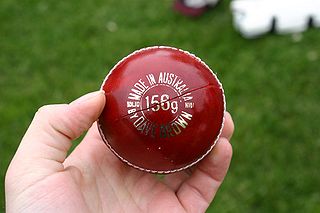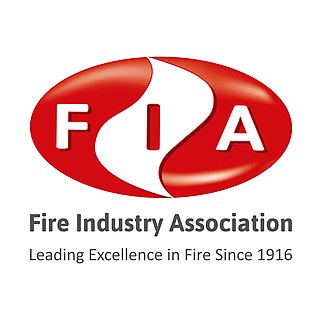
British Standards (BS) are the standards produced by the BSI Group which is incorporated under a royal charter and which is formally designated as the national standards body (NSB) for the UK. The BSI Group produces British Standards under the authority of the charter, which lays down as one of the BSI's objectives to:
Set up standards of quality for goods and services, and prepare and promote the general adoption of British Standards and schedules in connection therewith and from time to time to revise, alter and amend such standards and schedules as experience and circumstances require.
BS, B.S., Bs or bs may refer to:

In cricket, an over consists of six legal deliveries bowled from one end of a cricket pitch to the player batting at the other end, almost always by a single bowler.

A cricket ball is a hard, solid ball used to play cricket. A cricket ball consists of a cork core wound with string then a leather cover stitched on, and manufacture is regulated by cricket law at first-class level. The trajectory of a cricket ball when bowled, through movement in the air, and off the ground, is influenced by the action of the bowler and the condition of the ball and the pitch, while working on the cricket ball to obtain optimal condition is a key role of the fielding side. The principal method through which the batsman scores runs is by hitting the ball, with the bat, into a position where it would be safe to take a run, or by directing the ball through or over the boundary. Cricket balls are harder and heavier than baseballs.
BS 7799 was a standard originally published by BSI Group (BSI) in 1995. It was written by the United Kingdom Government's Department of Trade and Industry (DTI), and consisted of several parts.

The Nepal National Cricket Team represents the country of Nepal in International cricket and is governed by the Cricket Association of Nepal (CAN). They are Associate Member of the International Cricket Council (ICC) since 1996. Nepal were awarded Twenty20 International (T20I) status by the ICC in June 2014 until the 2015 ICC World Twenty20 Qualifier and One Day International (ODI) status from 2018.
British Standard BS 7671 "Requirements for Electrical Installations. IET Wiring Regulations", informally called in the UK electrical community "The Regs", is the national standard in the United Kingdom for electrical installation and the safety of electrical wiring in domestic, commercial, industrial, and other buildings, also in special installations and locations, such as marinas or caravan parks and medical locations

The Kitemark is a UK product and service quality trade mark which is owned and operated by the British Standards Institution.
ISO 11170:2003 is an international standard which defines a sequence of tests for verifying filter elements. It can be used to check their hydraulic, mechanical and separation characteristics. ISO 11170 is not intended to qualify a filter for a particular duty or replicate conditions of service. This can only be done by a specific test protocol developed for the purpose, including actual conditions of use. The procedure in ISO 11170 is applicable to individual fluids, or types of fluid having similar chemistry.
BS was BSI's standard in the field of Business Continuity Management (BCM). It was withdrawn in 2012 and 2013 following the publication of the international standards ISO 22301 - ″Societal Security — Business continuity management systems — Requirements″ and ISO 22313 - ″Societal Security — Business continuity management systems — Guidance″

The British Standards Institution (BSI) is the national standards body of the United Kingdom. BSI produces technical standards on a wide range of products and services and also supplies certification and standards-related services to businesses.
EN 1078, entitled Helmets for pedal cyclists and for users of skateboards and roller skates, is a European standard published in 1997. It is the basis of the identical British Standard BS EN 1078:1997. Compliance with this standard is one way of complying with the requirements of the European Personal Protective Equipment Directive.

Universal College, formerly the Universal College of Nursing, is a school located in Parañaque, Metro Manila, Philippines. It was established in 2005.
BS 8888 is the British standard developed by the BSI Group for technical product documentation, geometric product specification, geometric tolerance specification and engineering drawings.
ISO 20121 is a voluntary international standard for sustainable event management, created by the International Organization for Standardization. The standard aims to help organizations improve sustainability throughout the entire event management cycle.
ISO/IEC 27001 is an international standard to manage information security. The standard was originally published jointly by the International Organization for Standardization (ISO) and the International Electrotechnical Commission (IEC) in 2005, revised in 2013, and again most recently in 2022. There are also numerous recognized national variants of the standard. It details requirements for establishing, implementing, maintaining and continually improving an information security management system (ISMS) – the aim of which is to help organizations make the information assets they hold more secure. Organizations that meet the standard's requirements can choose to be certified by an accredited certification body following successful completion of an audit. The effectiveness of the ISO/IEC 27001 certification process and the overall standard has been addressed in a large-scale study conducted in 2020.
EN 50155:2017 is a regional standard covering electronic equipment used on rolling stock for railway applications. The standard covers aspects of this electronic equipment, including temperature, humidity, shock, vibration, and other parameters. A copy of the standard may be purchased from authorised standards agencies, e.g. BSI in the UK.

The Fire Industry Association (FIA) is a not-for-profit organisation formed originally by the merger of the Fire Extinguishing Trades Association (FETA) and the British Fire Protection Systems Association (BFPSA).






